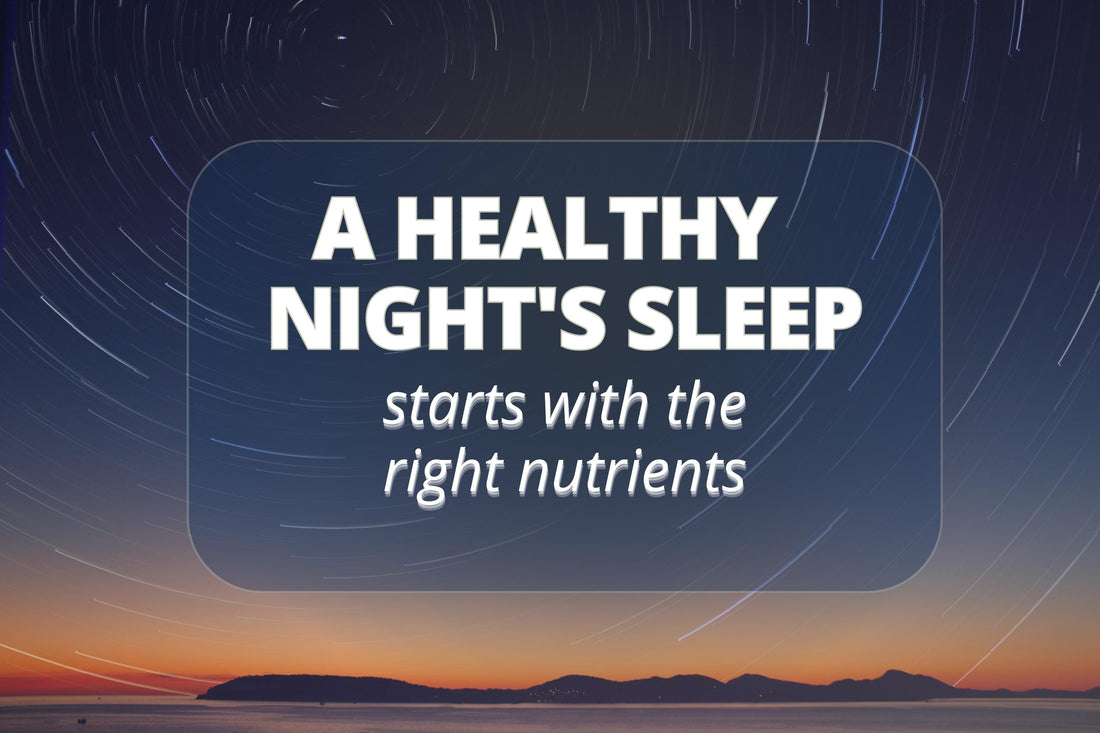
A Healthy Night's Sleep Starts with the Right Nutrients
Is it a treat for you to wake up in the morning without knowing what’s been happening the last eight or so hours? Did you wake up in the night for no apparent reason? Are you feeling drained and exhausted no matter how many hours of sleep you get? It might be time
to review your diet. Just like they say, you are what you eat! Eating the right nutrients can have a big impact on the quality of sleep you get each night. In this blog post, we’ll discuss the key nutrients that can help you get the restful night’s sleep you need.
Magnesium is one of the most important minerals your body needs for good health. It plays an
important role in regulating hormones, blood sugar balance, muscle relaxation, and calming the nervous system. Because magnesium helps relax muscles, it’s especially important for those who suffer from muscle cramps or restless legs syndrome. Blood sugar dips can also wake the sleeping, magnesium supports blood sugar balance.
Calcium is another important mineral for getting quality sleep. Calcium helps the body synthesise
melatonin, a hormone that helps regulate our sleep-wake cycle. This means that calcium helps your body know when it’s time to go to sleep and when it’s time to wake up.
Vitamin D is also important for getting enough sleep. Vitamin D helps regulate the release of
melatonin, so it’s important to get enough of this vitamin if you want to get a good night’s rest.
Vitamin D can be obtained through sun exposure and supplements.
In addition to these three nutrients, other vitamins and minerals can also help support quality sleep. Zinc, iron, and B vitamins have all been linked to better sleep, so it’s important to make sure you’re getting enough of these nutrients if you want to rest well.
Eating the right foods is essential for getting the nutrients your body needs for restful sleep. Here are some of the best foods to eat if you want to get more of the vitamins and minerals that promote restful sleep:
For magnesium, try eating dark leafy greens like spinach and chard, nuts and seeds like pumpkin and sunflower seeds, avocados, and dark chocolate.
For calcium, try eating yogurt, cheese, leafy greens like kale and collards, sardines, and tofu.
For vitamin D, try eating fortified cereals, eggs, salmon, mushrooms, and sardines.
For zinc, try eating beef, pumpkin seeds, cashews, and chickpeas.
For iron, try eating lean red meat, dark leafy greens, beans, and fortified cereals.
For B vitamins, try eating eggs, dark leafy greens, broccoli, and fish.
By eating a healthy, balanced diet that includes these foods, you’ll be getting the important nutrients your body needs to support a good night’s sleep.
In addition to getting the vitamins and minerals your body needs from food, you may also want to
consider taking a supplement to help support healthy sleep. Supplements can be especially helpful for those who don’t get enough of certain vitamins and minerals from their diet.
If you’re looking for a supplement to help support sleep, look for something that contains
magnesium, calcium, zinc, iron, and B vitamins.
Other nutrients that can be found in supplements to help support sleep include:
Camomile a member of the daisy family, they can be used to alleviate feelings of anxiety, stress, and restlessness, supporting sleep.
L-Theanine is an amino acid found in green tea, studies find that whilst L-Theanine isn’t a sedative it does improve sleep significantly through it’s calming effects.
L-Tryptophan supports the production of serotonin, a neurotransmitter associated with sleep and balancing melatonin levels and also supports blood sugar balance.
Montmorency Cherry is one of the few known food sources of melatonin, a natural compound produced in the brain's pineal gland, to control the body's natural sleep cycles and circadian rhythms.
When choosing a supplement, it’s important to look for one that is made from natural ingredients and is third-party tested for safety and purity. Be sure to talk to your doctor or health professional before taking any new supplements, if you’re on any medications.
A good night’s sleep is essential for our overall wellbeing. And while there are many things that can influence the quality of our sleep, one of the most important factors is the nutrients in our diet. By eating the right balance of foods rich in these key nutrients, you can improve your sleep and give your body the energy it needs to take on tomorrow.
